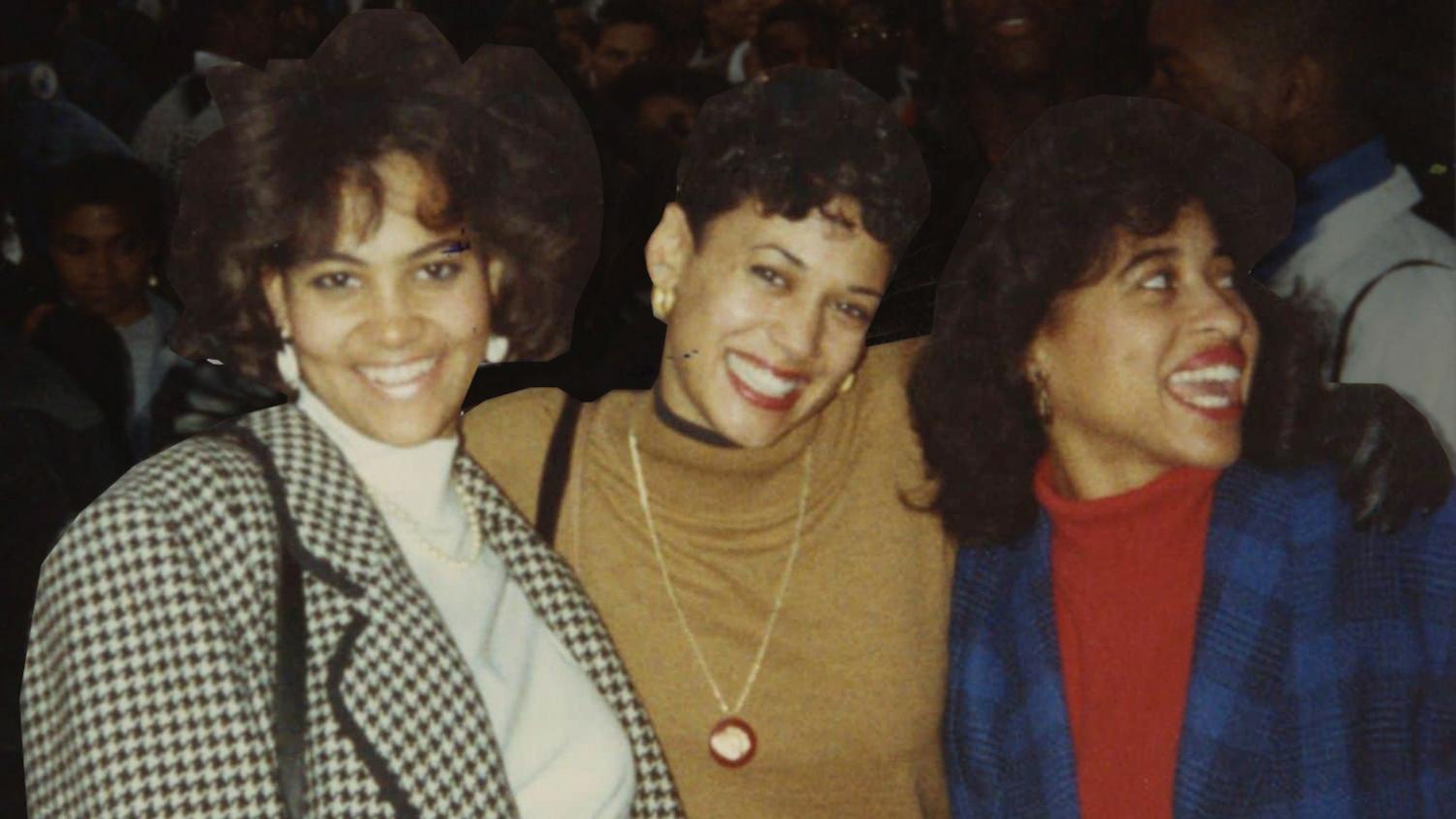How this historically black college gymnastics team made history
- Published
Watch: These black gymnasts are making history
For decades, thousands of black high school gymnasts have been faced with a difficult decision: either join a historically black college or university (HBCU) or keep their gymnastics careers alive.
HBCUs are cherished among black Americans as a chance to join the legacy of the historical black leaders who once attended them, like Martin Luther King Jr. Many black students say they also provide a safe environment, free of the racial hostility they can experience in spaces where they are in the minority.
But for those who have spent their childhood devoted to gymnastics, HBCUs were never an option if they wanted to compete at the university level.
Until now.
This year, Fisk University in Tennessee launched the first ever HBCU gymnastics team, 42 years after the sport was introduced to colleges and universities.
Morgan Price, a 17-year-old freshman, had originally accepted a full scholarship to the University of Arkansas, which has a big athletic programme. But when she learned about Fisk's new team, everything changed.
"Growing up in the sport, I was probably one of the only black girls on the team," Ms Price said, referring to the various teams she had been part of in clubs and in school. "So when I took the visit and it was like seven of us black girls, it was crazy to think that all of us were literally going to be on the same team."
Had it not been for Derrin Moore, founder of advocacy organisation Brown Girls Do Gymnastics, the Fisk Bulldogs gymnastics team may never have been born.
For years, the 47-year-old had been trying to get HBCUs to launch a gymnastics program. And for years, she was met with silence and rejection.
'It's not a black sport'
There were scarcely any women of colour in gymnastics in the 1980s when Ms Moore was a young gymnast.
Today, membership in USA Gymnastics, the national governing body for all levels of the sport in the US, is still predominantly white. Only 4.6% of members identify as African American and 5.4% as Hispanic, according to data gathered by the Washington Post in 2021. Comparatively, about 12.1% of the US population identify as African American, and 18.9% identify as Hispanic, according to the 2020 Census.
Ms Moore said the lack of diversity in the sport brought with it unwanted attention and unpleasant experiences. She said she was teased about her hair, endured jokes about the white gym-chalk on her black skin and listened to her white teammates use the N-word.
"It definitely made me feel… know that I was different," Ms Moore said.
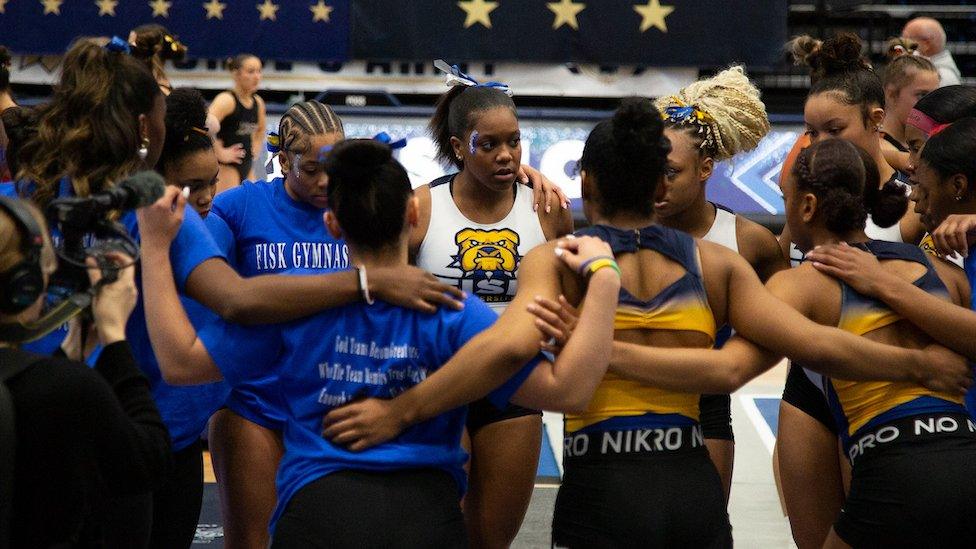
Black Americans are underrepresented in all levels of gymnastics, according to the Washington Post
Ms Moore made her first-ever plea for an HBCU to start a gymnastics program in 1995, during her sophomore year at Xavier University. Instead, they suggested she join the cheerleading squad, she recalled.
"They didn't have a team and weren't planning on getting one," she said.
The thought among HBCUs, lingering even today she said, was that "it's not a black sport".
The "weaponisation" of "racist beauty standards" has remained a barrier for black gymnasts, according to the Psychiatric Times, a medical trade publication.
The high costs associated with the sport have also been a deterrent. Black communities are disproportionately low-income, making it difficult to introduce gymnastics, which requires a lot of expensive equipment.
More than two decades later, she still had not given up hope.
She launched an Instagram account in 2016 called Brown Girls Do Gymnastics, hoping to boost the sport's profile among black Americans and defy the stereotype. Around the same time, Olympic medallists Simone Biles and Gabrielle Douglas were entering the national spotlight.
Allow Instagram content?
This article contains content provided by Instagram. We ask for your permission before anything is loaded, as they may be using cookies and other technologies. You may want to read Meta’s Instagram cookie policy, external and privacy policy, external before accepting. To view this content choose ‘accept and continue’.
Ms Moore eventually began using her Instagram to call on HBCUs directly. For years, she created mock team logos and tagged schools on social media.
"We just weren't being responded to at all," Ms Moore said. "We would send letters, emails, make phone calls. We weren't even able to talk to athletic directors."
'Want to be a part of history?'
Jordynn Cromartie, a freshman on Fisk University's gymnastics team, almost became one of the countless black gymnasts forced to forgo her HBCU dreams.
The 18-year-old said she had originally committed to Utah State to join their gymnastics team.
"It was just one of those gut-wrenching things that I would've had to just end up getting over," she said.
Things changed, however, in November 2021, after she had a dinner conversation with her uncle Frank Simmons, a Fisk board member.
"Why aren't you going to Fisk? Why aren't you going to an HBCU?" she recalled him asking her.
"Because HBCUs don't have gymnastics," she explained.
Within days, he picked up the phone and called Ms Moore.
After one presentation to Fisk's board of trustees, a board member donated $100,000. She had to convince them that the fan base for gymnastics had grown and that they would see a strong return on their investment, Ms Moore said.
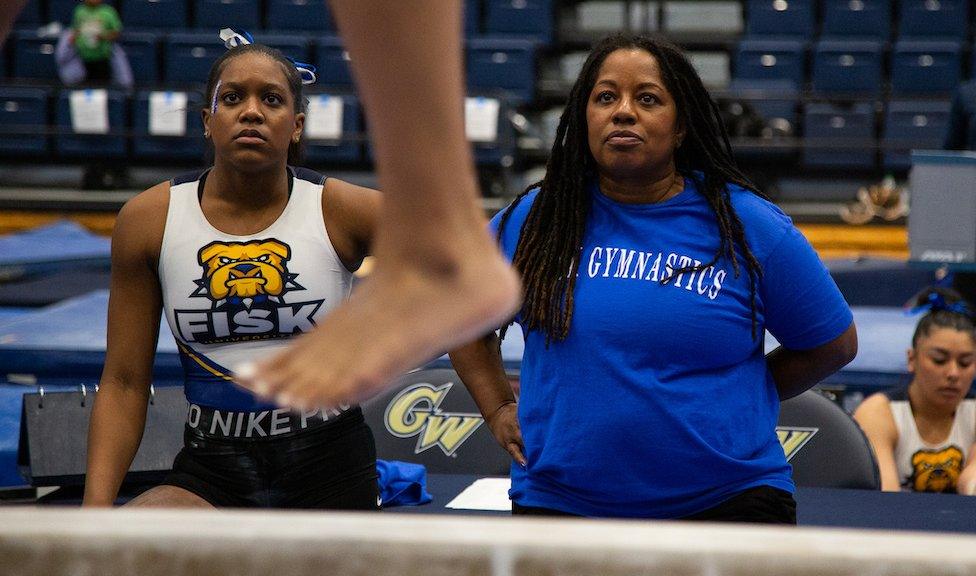
Corrine Tarver (right) is making history again as the coach for the Fisk University gymnastics team
One of the next calls made was to Corrine Tarver, the first black woman to win an NCAA all-around title for gymnastics at Georgia University in 1989. She is now the Fisk University Bulldogs' head coach.
To recruit the team, Ms Tarver asked one question: "Want to be a part of history?"
Defying gravity
Last month, when the Bulldogs arrived to compete in a match at George Washington University, a record-breaking 2,050-person crowd showed up to witness history in the making.
The final event of the meet for the Bulldogs was the vault.
Ms Price, who rejected the scholarship to Arkansas to join Fisk, stood near the edge of the narrow runway and peered into the distance at the springboard.
She sprinted toward it, launched her body backward into the air, flung off the board, flew into the sky - twisting, turning and flipping - before she landed firmly, both feet on the ground, with a slight bounce backward.
The crowd roared, and the stands vibrated with the school colours of not just Fisk, but HBCUs from around the country.
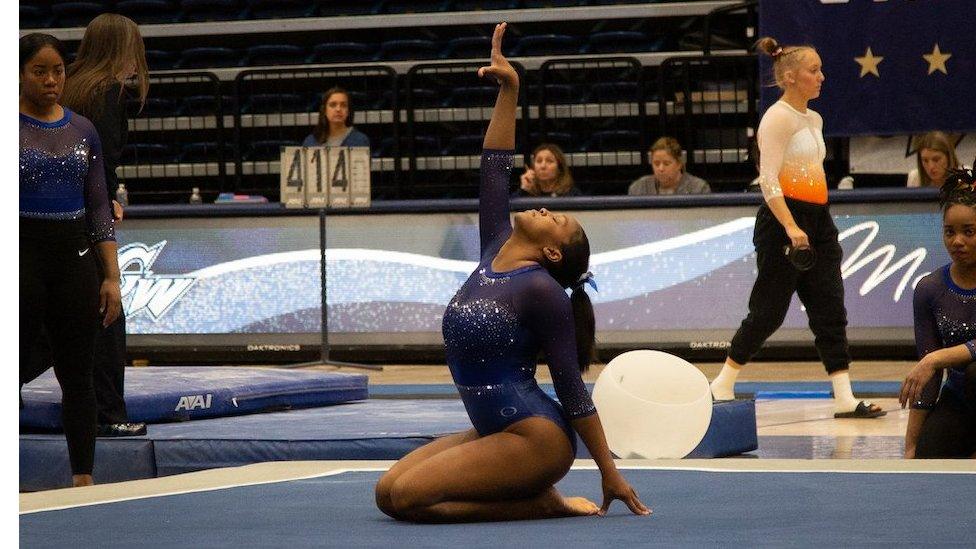
Morgan Price is competing at the Women's Collegiate National Championships April 6-8
"I was obviously walking away from a lot," Ms Price told BBC about her decision to turn down the University of Arkansas to join Fisk's team, which is still raising money for its own gym.
"But I knew deep down, at the end of the day, it's bigger than gymnastics."
"Our ancestors went to these schools. That's why I've always wanted to go to an HBCU, because I know that it's a way to honour them," she added.
When the competition ended, Ms Price and the rest of the Bulldogs walked over to meet with fans eager to embrace them.
A young girl in the front pulled her jacket down and turned around to reveal the back of her shirt.
It read: Brown Girls Do Gymnastics.
"It's about more than just being a gymnast," Ms Price said. "It's about how you make an impact on the world."
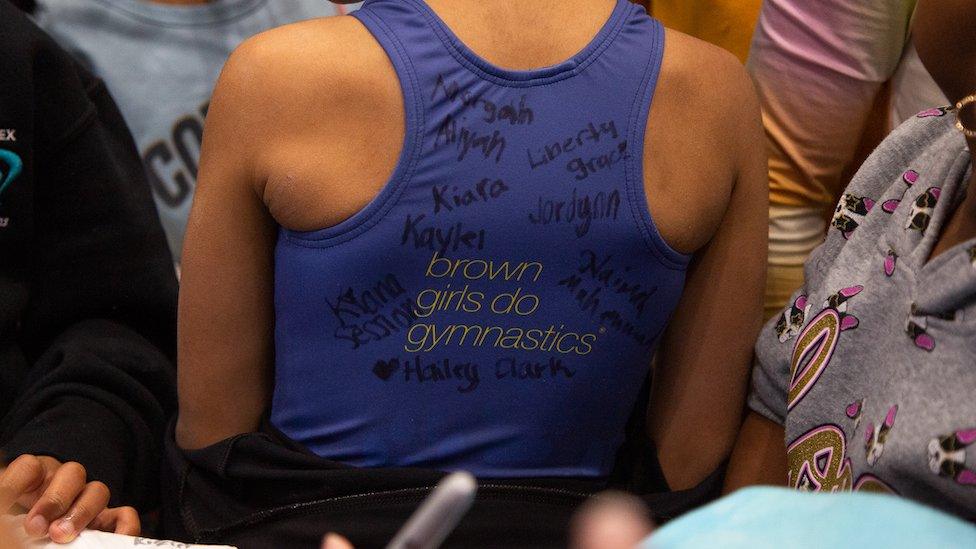
Related topics
- Published3 April 2023
- Published4 August 2021
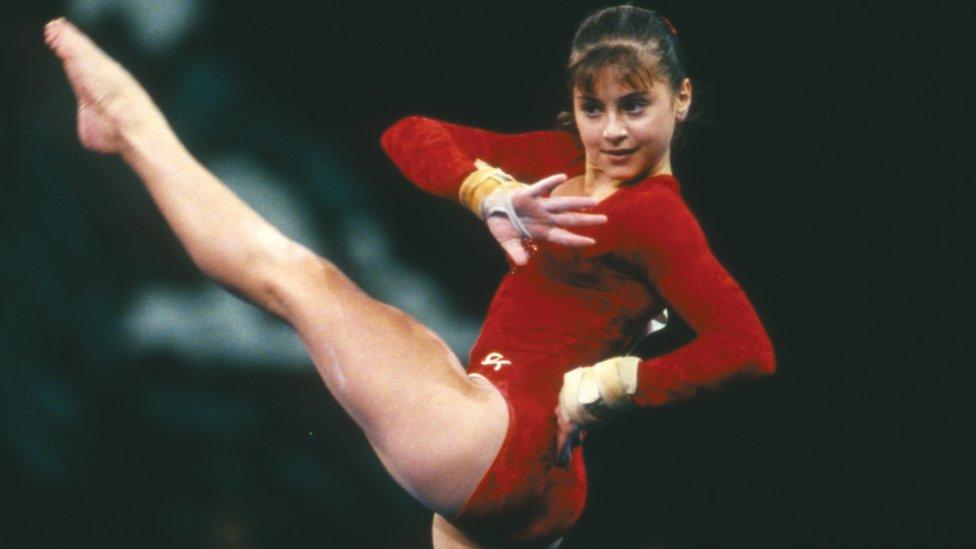
- Published20 January 2021
